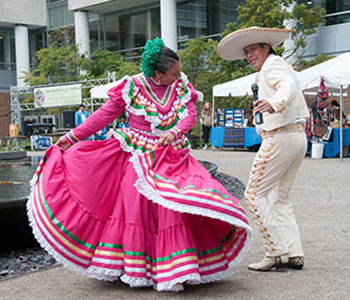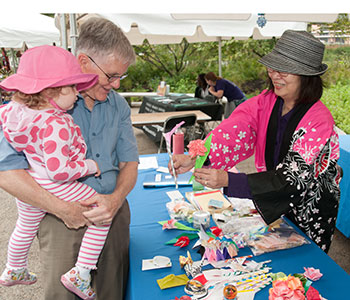
At this year’s Washington University in St. Louis Global Health Week, the public can watch Ethiopian dancers, listen to the melodies of Argentina and attend a lecture by the former president and health minister of Ecuador. Attendees also can buy ethnic food, shop for artisan crafts and ask Global Health Scholars, medical students and undergraduates about their outreach efforts.
“This event is held to bring our Washington University schools and community partners together as a united, multidisciplinary team that will learn, exchange ideas and lead in global efforts abroad and in our local St. Louis community,” said Basia Najarro, event organizer and co-director of the Global Health Scholars in Medicine program in the Department of Medicine.
Each year, the Global Health Scholars in Medicine program offers 10 internal medicine residents an opportunity to treat refugees and immigrants at clinics such as Family Care Health Centers and Casa de Salud here in St. Louis. It also gives them a chance to learn from experts in international medicine through workshops and conferences and to practice medicine abroad for a month.
The third annual Global Health Week, held this year from Sept. 23-27, will have four components:
Sept. 23 and 24, Global Health Scholars and students from the School of Medicine, School of Engineering, St. Louis College of Pharmacy and the Danforth Campus will provide meals to clients at Food Outreach and teach fifth-and sixth-grade students at City Academy about access to health care in different countries.
Sept. 25-27, an international fair will be held at the Ellen S. Clark Hope Plaza on the Medical Campus. Plaza events will include a farmers’ market, food booths, live entertainment and artisan crafts. For more information, visit here.
From Sept. 23-27, a speaker series will be held on the Danforth and Medical campuses. Alfredo Palacio, MD, former president and health minister of Ecuador, will give three lectures. As part of the Washington University Assembly Series, he will give a talk, “Government and Health Care: Perspectives from a President and a Physician,” at 5 p.m. Sept. 25 at Graham Chapel on the Danforth Campus. Other speakers during the week will include William Powderly, MD, the J. William Campbell Professor of Medicine and director of the Washington University Institute for Public Health; Anita Chary, PhD, anthropologist and MD/PhD candidate at the university; and David Wang, PhD, associate professor of molecular microbiology and of pathology and immunology. For a full schedule, visit here.
Sept. 25, a “meet and greet” event will be held 6:30-8:30 p.m. at the St. Louis Zoo. This event, which costs $50 per person, includes remarks by Palacio, a world tour of fashion, a reception and live entertainment. For more information, visit here. Students and residents can receive a 50 percent discount by visiting ghs.wustl.edu, clicking on the Meet and Greet tab and using the code GHWEEK when buying a ticket.

(Credit: Robert Boston)
The 2013 Global Health Week is sponsored by the Global Health Scholars in Medicine, Institute for Public Health, School of Engineering & Applied Science, the Weidenbaum Center on the Economy, Government and Public Policy and the Gephardt Institute for Public Service. Other sponsors include Barnes-Jewish Hospital, St. Louis College of Pharmacy, St. Louis Zoo and Food Outreach. The event also is made possible through a partnership with Northwestern Mutual and the U.S. Army.
For the complete schedule, visit here.
Melvin Blanchard, MD, associate professor of medicine and director of the Department of Medicine residency program, said he hopes Global Health Week will highlight health issues and motivate people to engage in activities that foster better health for themselves and their neighbors.
“Global health is about better health for everyone, regardless of the community where they live,” he said. “We must be concerned with the health of all, not only from a humanitarian standpoint, but because we inhabit a world where we travel, we migrate, and we share the same water and air. This makes us all vulnerable, not only to infectious diseases, but to habits that promote diabetes, heart disease and cancer.”